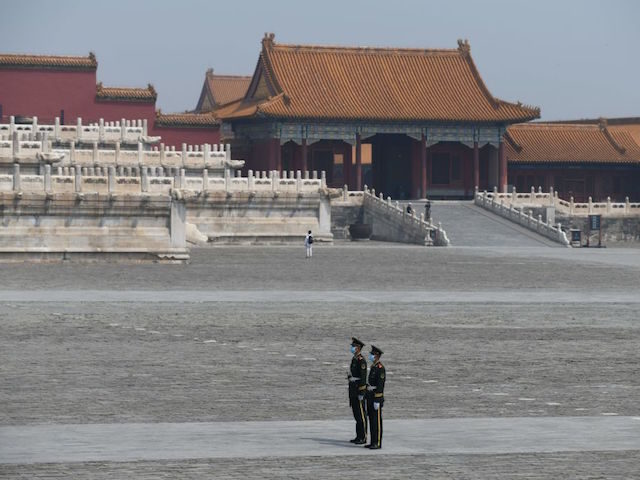The world’s Communist governments and their supporters largely made do on Friday without the lavish parades, violent mobs, and attacks on dissidents that typically embolden International Workers’ Day, or “May Day.”
Once a pagan holiday to mark the change in seasons, May Day became “International Workers’ Day” in the late 1800s and early 1900s in the hands of white Marxists seeking to create a “proletarian holiday” in the West. Currently, the world’s Communist nations typically use May Day to force citizens to engage in thousands-strong rallies to celebrate their ideology, believed to have killed at least 100 million people throughout its history.
Outside of the Communist world – particularly in European capitals like Paris – Marxists use May Day as an excuse to riot violently and intimidate law-abiding citizens in the name of upholding workers’ rights.
The Chinese coronavirus pandemic – itself the product of a communist society – has canceled nearly all of the world’s mass gatherings, however, making it impossible for much of the international left to celebrate its flagship holiday. Instead, governments and leftist groups organized “social distancing” observances of the day.
In Cuba, dictator Raúl Castro tasked his second-in-command, “President” Miguel Díaz-Canel, with leading what state propaganda outlet Granma called “a proletarian assault on the digital plaza from home,” a reference to the traditional venue for Cuba’s May Day parade, the Plaza of the Revolution in Havana.
“We will not march in the Plaza, but from our homes we will celebrate that workers lift and sustain the Nation despite embargo, wars, and threats,” Díaz Canel said last week on Twitter, a reference to the poorly enforced American economic embargo on Cuba.
On Friday, Díaz-Canel posted a photo of himself wearing a sanitary mask and using the hashtag #MiCasaEsMiPlaza, or “My House Is My Plaza,” on Twitter. The goal, Cuban officials insisted, was to turn Twitter itself into the venue for a communist rally.
“Our homage and applause to those who sustain life and defend it with sacrifice, submission, and commitment,” the communist official wrote.
Other Cuban officials boasted large shrines to late dictator Fidel Castro in their homes in lieu of the giant posters typically carried in Cuba’s parades.
China, typically home to one of the world’s largest May Day parades, celebrated by announcing the removal of several coronavirus-related mobility restrictions in the capital, Beijing. According to the state news service Xinhua, authorities reopened the Forbidden City, the former palace of China’s emperors, to the public in a limited capacity.
In Tiananmen Square, site of one of communism’s deadliest massacres, authorities replaced the thousands of people who would normally fill the plaza for May Day with bright red flowers.
Mao Zedong, China’s first Communist dictator, banned flowers for their alleged association with bourgeois luxury.
In Vietnam, May Day is eclipsed by April 30, the anniversary of the communist takeover of South Vietnam and reunification of the country. Vietnamese newspapers published images of soldiers raising the Vietnamese flag and observing the 45th anniversary of the event in Hanoi on Thursday. The soldiers do not appear to be practicing much social distancing, but crowds of civilians are clearly not visible in the photos.
Vietnam claimed on Friday it had marked the 15th consecutive day of not identifying a single case of Chinese coronavirus in the country.
In Turkey, where the secular left has remained a prominent political voice for decades, union groups and far-left parties marked the holiday with what the national newspaper Hurriyet called “social distancing” events. Leftists in Australia did the same thing, organizing a car and bicycle “rally” in Sydney that allowed participants to stay in their vehicles away from each other.
Local reports estimated barely 200 people participated in Sydney’s May Day event.
“When it comes to ensuring that we mark May Day – and ensuring that we respect the right to protest – that clearly falls within the concept of a reasonable excuse [to be outside],” David Shoebridge, an Australian lawmaker for the Green Party, told the Australian Associated Press.
Participants decorated their cars with signs reading messages like “no to capitalism” and “end imperialism.”
Leftists in the Philippines faced tougher restrictions. The leftist group Kilusang Mayo Uno (KMU) claimed police arrested over 50 of their activists on Friday, most of them on the island of Luzon, the nation’s largest. The group complained its May Day activities including offering free food to impoverished workers kept from making a living by the nation’s strict coronavirus lockdown.
“The protest rallies clearly violated the stay-at-home policy of the government. It is a form of mass gathering that is prohibited, especially in ECQ areas which are high-risk areas for COVID-19,” Department of the Interior and Local Government spokesman Jonathan Malaya told the Philippine Inquirer. “By doing so, they risked their lives and the lives of others which government is duty-bound to protect. The Supreme Court has ruled many times that the right to free speech is not absolute and is subject to limitations. Its exercise must be within the bounds of the law.”

COMMENTS
Please let us know if you're having issues with commenting.